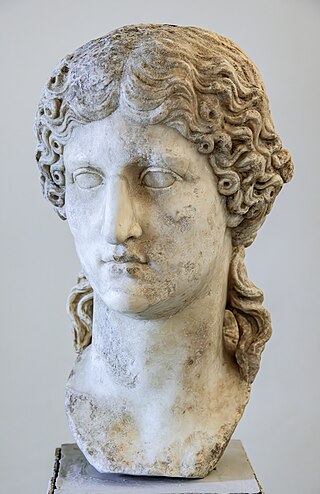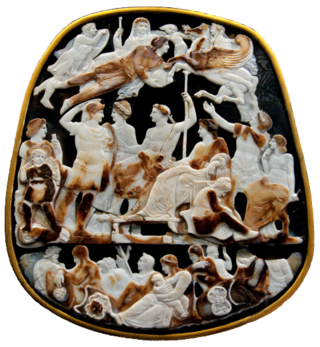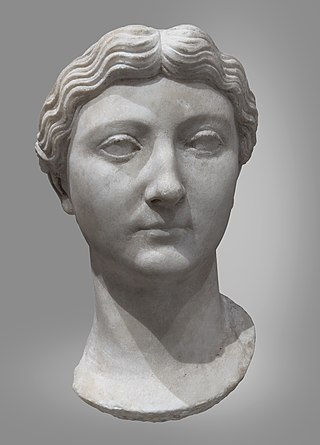
(Vipsania) Agrippina the Elder was a prominent member of the Julio-Claudian dynasty. She was the daughter of Marcus Vipsanius Agrippa and Augustus' daughter, Julia the Elder. Her brothers Lucius and Gaius Caesar were the adoptive sons of Augustus, and were his heirs until their deaths in AD 2 and 4, respectively. Following their deaths, her second cousin Germanicus was made the adoptive son of Tiberius, Augustus' stepson, as part of the succession scheme in the adoptions of AD 4. As a result of the adoption, Agrippina was wed to Germanicus in order to bring him closer to the Julian family.

The Julio-Claudian dynasty comprised the first five Roman emperors: Augustus, Tiberius, Caligula, Claudius, and Nero.

Around the start of the Common Era, the family trees of the gens Julia and the gens Claudia became intertwined into the Julio-Claudian family tree as a result of marriages and adoptions.
AD 33 (XXXIII) was a common year starting on Thursday of the Julian calendar. At the time, it was known in the Roman world as the Year of the Consulship of Ocella and Sulla. The denomination AD 33 for this year has been used since the early medieval period, when the Anno Domini calendar era became the prevalent method in the world for naming years.

Livia Drusilla was Roman empress from 27 BC to AD 14 as the wife of Augustus, the first Roman emperor. She was known as Julia Augusta after her formal adoption into the Julia gens in AD 14.
Julia is the nomen of various women of the family Julii Caesares, a branch of the gens Julia, one of the most ancient patrician houses at ancient Rome.

Claudia Livia was the only daughter of Nero Claudius Drusus and Antonia Minor and sister to Roman Emperor Claudius and general Germanicus, and thus paternal aunt of emperor Caligula and maternal great-aunt of emperor Nero, as well as the niece and daughter-in-law of Tiberius. She was named after her grandmother, Augustus' wife Livia Drusilla, and commonly known by her family nickname Livilla. She was born after Germanicus and before Claudius.
Rubellius Plautus was a Roman noble and a political rival of Emperor Nero. Through his mother Julia, he was a relative of the Julio-Claudian dynasty. He was the grandson of Drusus, and the great-grandson of Tiberius and his brother Drusus. Through his great-grandmothers Vipsania Agrippina and Antonia Minor, he was also descended from Marcus Vipsanius Agrippa and Mark Antony. He was descended from Augustus' sister Octavia Minor, herself a grand-niece of Julius Caesar.

Julia Livia, was the daughter of Drusus Julius Caesar and Livilla, and granddaughter of the Roman Emperor Tiberius. She was also a first cousin of the emperor Caligula, and niece of the emperor Claudius.

Vipsania Agrippina was the first wife of the Emperor Tiberius. She was the daughter of Marcus Vipsanius Agrippa and Attica, thus being a granddaughter of Titus Pomponius Atticus, the best friend of Cicero.

Scribonia was the second wife of Octavian, later the Roman Emperor Augustus, and the mother of his only biological child, Julia the Elder. Through this daughter, she was the mother-in-law of the Emperor Tiberius, great-grandmother of the Emperor Caligula and Empress Agrippina the Younger, and great-great-grandmother of the Emperor Nero.
Gaius Rubellius Blandus was a Roman senator who lived during the Principate. Blandus was the grandson of Rubellius Blandus of Tibur, a member of the Equestrian class, who was the first Roman to teach rhetoric. He was suffect consul from August to December AD 18 with Marcus Vipstanus Gallus as his colleague. In AD 33, he married Julia Livia, granddaughter of the Roman emperor Tiberius.
Gaius, sometimes spelled Caius, was a common Latin praenomen; see Gaius (praenomen).
Marcus Livius Drusus Claudianus was a senator and praetor of the Roman Republic. He was born with the name Appius Claudius Pulcher, into the patrician family of the Claudii Pulchri but adopted by a Livii Drusi as a small child. His daughter Livia Drusilla became the wife of the first Roman Emperor Augustus, and he was a direct ancestor of the Julio-Claudian emperors Tiberius, Caligula, Claudius and Nero.

Octavia the Younger was the elder sister of the first Roman emperor, Augustus, the half-sister of Octavia the Elder, and the fourth wife of Mark Antony. She was also the great-grandmother of the Emperor Caligula and Empress Agrippina the Younger, maternal grandmother of the Emperor Claudius, and paternal great-grandmother and maternal great-great-grandmother of the Emperor Nero.

The Julii Caesares were the most illustrious family of the patrician gens Julia. The family first appears in history during the Second Punic War, when Sextus Julius Caesar was praetor in Sicily. His son, Sextus Julius Caesar, obtained the consulship in 157 BC; but the most famous descendant of this stirps is Gaius Julius Caesar, a general who conquered Gaul and became the undisputed master of Rome following the Civil War. Having been granted dictatorial power by the Roman Senate and instituting a number of political and social reforms, he was assassinated in 44 BC. After overcoming several rivals, Caesar's adopted son and heir, Gaius Julius Caesar Octavianus, was proclaimed Augustus by the senate, inaugurating what became the Julio-Claudian line of Roman emperors.
Marcus Sergius or Servius Octavius Laenas Pontianus was a Roman politician of the early second century. He served as consul in AD 131, alongside Marcus Antonius Rufinus, during the reign of Hadrian.
Gaius Octavius Laenas was a Roman senator, who was active during the Principate. He was suffect consul in the second half of AD 33 as the colleague of Lucius Salvius Otho. Laenas was also curator aquarum, or overseer of the aqueducts and water supply of Rome from the death of Marcus Cocceius Nerva from about the year 33 to the year 38.
The gens Rubellia was a minor plebeian family at ancient Rome. Members of this gens are first mentioned in the time of Augustus, and they achieved prominence during the first century, when two of them obtained the consulship: Gaius Rubellius Blandus in AD 18, and Lucius Rubellius Geminus in AD 29.









